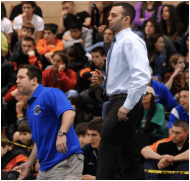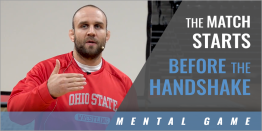|
By: Peter Jacobson Want to start a heated discussion (read: argument) amongst your coaching colleagues? Walk into any room with several coaches and start talking about either school teams vs. club teams, or how hard it is to get today's kids to stay committed and engaged. Your choice. Sit back and enjoy the show. As you might imagine, there was recently a pretty heated discussion about this stuff in a group I'm part of. Here's the original issue raised by a high school softball coach (lightly-edited for length!): This year, my players, especially those on the bench, have been very disengaged and my players on the field not wanting to step up and take a vocal leadership role. We're seeing an increase of outside/travel/club/specialized teams playing on weekends during the school season. I have players who are off playing Volleyball/Basketball/Tennis tournaments each weekend. Has anyone seen a larger overall disengagement from players who are doing all of this extra? Do they seem to be physically and mentally fatigued? Does playing extra remove the specialness of games when they play games all the time? How can I get these girls more engaged and rebuild a team culture, given the nature of youth sports today? How frustrating is it to feel like your players just don't care that much and never step up?! It makes you question why you even bother! It seems like we all hear stuff like this more and more in today's sports culture. So the million dollar question is: what can we do about it?? So many coaches talk about "turf wars" between their high school programs and travel or club teams. In my opinion, both have their place, but they have different purposes and serve different roles. One of the major differences is that many of these "outside" programs are geared towards competition and individual exposure. While high school teams are part of educationally-based athletic programs - they exist to further the educational and developmental goals of the schools they're a part of. As a high school coach, I think that's one of our biggest assets. It's that framework that allows us to focus on some of the most important aspects of kids' athletic experiences: character development, sacrifice for a cause greater than the individual, and getting past the selfishness/entitlement that seems to be popping up more and more in today's culture. Really focusing on these areas has been an awesome way to create motivated and engaged players in our program. It all comes back to our ability to develop leadership and a strong, positive culture in our program. And we're not special. It can work for any team. In my humble opinion, the strongest solution to these types of problem is not complicated. In one word, that solution is "caring." Obviously, you caring about your student-athletes (which clearly is not the issue for you guys or you wouldn't be here!), but also finding ways to get your kids to care deeply about each other. Think about it this way: when kids care deeply about each other and about the good of the group, suddenly the experience becomes special. When there's a family-feel to your culture, built around a common community identity, you differentiate your program in a positive way from programs focused on showcase tournaments and playing a million games. When kids care about their teammates and coaches as people, and that feeling is reciprocated, it creates an environment kids love being a part of. Now suddenly they're training and playing for a bigger cause - something they care more about. These are engaged players. These are players who work hard in order to not let each other down, and, finally, these become players who start to hold each other to a higher standard because they become less tolerant of others letting the group down with less than their best effort. In my experience, it's energizing and it's contagious! I think we can all agree that type of environment would be an amazing coaching situation! The thing is, it doesn't happen by chance - only with great intentionality about how you develop it. And it doesn't happen overnight. But nothing great ever does! Ok, that's great, Pete, but what, specifically, can we do to make this happen? How do you create a culture of caring? Glad you asked! First and foremost, in our program, it started with creating a compelling vision, philosophy and shared values for our program that our team could get behind and buy into. Involving them in the process was key here. If you want to really engage your kids get them a cause to rally around that's bigger than themselves. And If you want to give them a meaningful cause, give them a vision, a philosophy and a set of values that are inspirational and motivating. Not sure how to do this? Stay tuned for future articles about it! It seems silly to say, but I really think the next most important thing is simply having a long-term mentality, as a coach. Understand that you can create the culture of caring you want, but that it won't happen overnight. It takes time (like anything worthwhile!), commitment, and, occasionally, taking two steps forward and one step back with your team. Finally, choosing the right culture development tactics and strategies to use with your team is super important. I like to start each season by making sure I have a strong culture amongst my coaching staff and then use those connections to start building a strong culture amongst our kids. If you haven't seen it, I wrote about one of the unique ways we start the season to build buy-in from our coaching staff and then leverage it to build even more buy-in from our athletes. Taking a few minutes before your season starts to think through a meaningful vision, philosophy and set of core values can be transformational for your program and for you as a coach. (It definitely was for me!) Then, coming up with effective ways to integrate them into your culture is where "the rubber meets the road" and you really start see the results take hold! Not sure where to start? Check out 10 of the most unique and effective tactics we've used to develop and reinforce a deep culture of caring amongst the kids in our program. Sometimes it's the stuff that has nothing to do with the "x's and o's" that has the greatest positive impact on our programs and on our kids' lives. Have at it, Coach!
|




 Pete Jacobson has been a varsity HS coach in New York for almost 20 years. He also works with coaches of all levels through
Pete Jacobson has been a varsity HS coach in New York for almost 20 years. He also works with coaches of all levels through 


